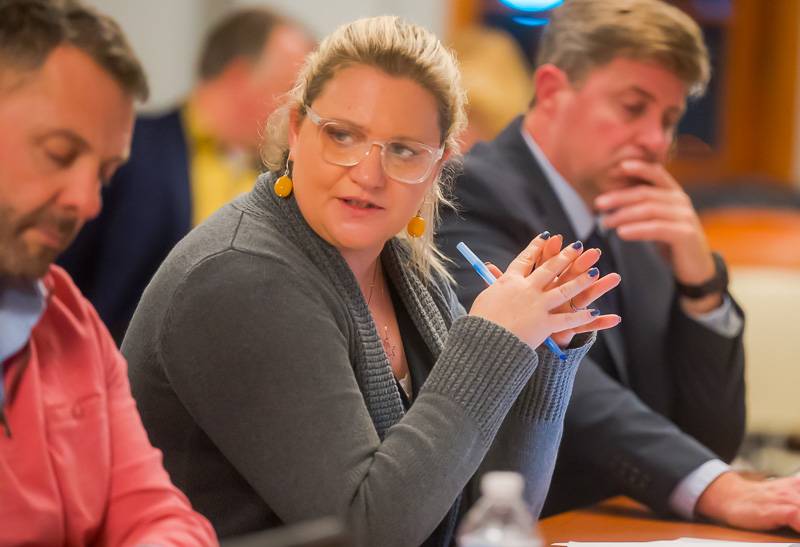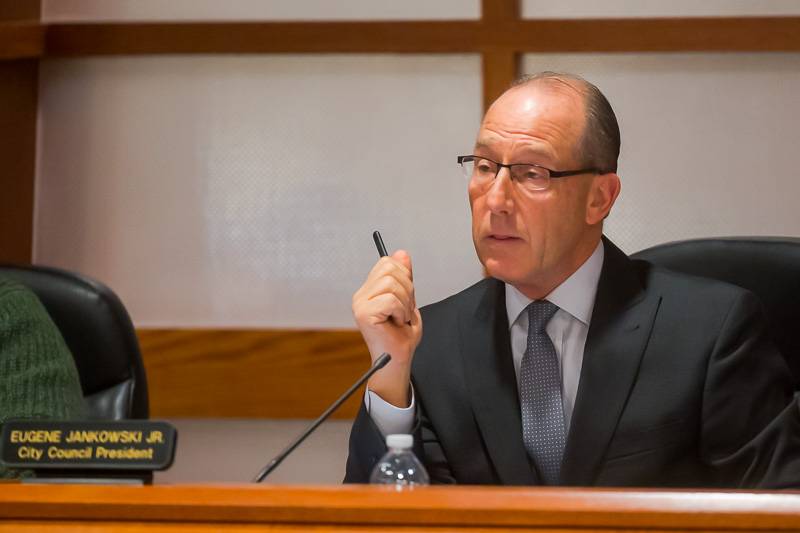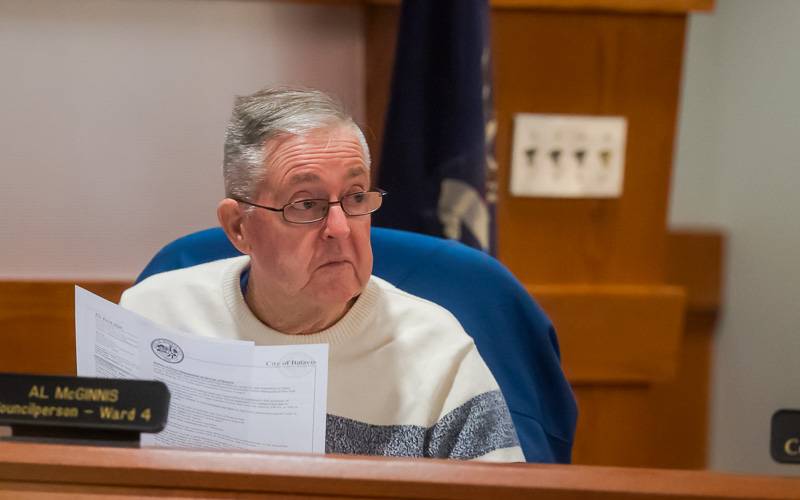A city revenue workgroup brainstormed several potential strategies in the past few months for ways to infuse the city’s coffers, including boosting the tax base with new developments; encouraging legal retail cannabis shops; pursuing voluntary public service contributions from nonprofits; selling off city properties; and enact a stormwater user fee.
Out of the myriad suggestions and ideas, they’re all on the table, with not one seeming to be the magic solution just yet, City Manager Rachael Tabelski said during a review of the process so far.

Photo by Howard Owens
“So the workgroup wanted to find new revenue sources to continue to assist the city in keeping a low tax rate while providing critical services to the residents, as current major revenue sources are limited, and rely heavily on property and sales tax,” Tabelski said during City Council’s business meeting Monday at City Hall. “And just to note, the aid from the state has not increased nor decreased in the last five-plus years. But I want to point out that our group didn't find a single silver bullet.
"There's no one answer to give us a sustainable revenue source that's going to allow us to pay our employees the wages they deserve to do the work that our residents require," she said. "So it's going to be an amalgamation of many different strategies, some that are one-time revenue sources, some that we might be able to count on an ongoing basis, like the cannabis tax.”
The goal of the group, first and foremost, was to understand the current sources and trends of revenue, and then to draft new ideas for how to bring in more of it, she said.
She noted that the property tax levied in the city “has grown slowly over time, as has sales tax revenue that has remained flat,” including the cable franchise fees, utilities and state aid. Fines, forfeited, and parking ticket revenues have decreased significantly, though new software has allowed for online parking ticket payments, tracking — and even an opportunity to dispute them, Police Chief Shawn Heubusch said.
That new system will be a way to bring those numbers up to estimated revenues of $25,000 in 2024-25, he said.
Tax-exempt properties make up 32 percent of the tax base in the city, which is a lower number than some council members expected, they said. And it’s about half of the nonprofits in other municipalities such as Salamanca, Rensselaer, Albany, and Ithaca, according to group findings.

Photo by Howard Owens
“I think it’s important that you put that stat in there, because it seems like more, you know what I mean? I mean, compared to the feedback I received from the public, it seems like we're being overrun with nonprofits. I kind of thought the same thing. That perception was off from the reality of this statistic. Because when you look at this statistic, we're not going to be as bad,” Council President Eugene Jankowski Jr. said. “So maybe we should be aware of it early. It's a good thing. So that we can keep an eye on that, so we don't get overwhelmed. Like 60 percent, that's a lot.”
The point was that other municipalities, many with larger portions of non-taxpaying property owners, have approached these owners and asked if they would be willing to pay something for their police, fire and any other public services received.
In one case, a university agreed to help out and paid a regular, and "lucrative" fee -- only after being asked for it.
Tabelski also reviewed a stormwater user fee that would be paid for by all property owners.
“So any building or parcel that is a sewer or water user today, pay sewer and water fees to the utility. While they may not pay property taxes, they still have to make those utility payments,” she said. “If we were to continue to explore sectioning out stormwater as a utility, which I do feel is a very good idea because we have multiple different unique characteristics of stormwater in our city, including the big ditch and the Grand Canal that we certainly could formulate capital plans for. We wouldn't be able to spread that user fee across anyone who has an impervious surface area. And we might be able to reduce that fee. Now, it would not be part of the general levy. For our property owners, it would be a utility user fee. So the more square feet or surface area you have, the more you would pay in a runoff stormwater type fee.”
This involves a complete analysis of the maintenance of the stormwater system to determine whether existing operation and maintenance gaps exist, Tabelski said. If gaps are identified, the analysis will provide an estimate of additional tasks necessary to rectify these gaps and how that would impact future revenue requirements for the Stormwater Fund and capital improvements.
Stormwater currently functions as a department within Public Works and is supported by the taxpayer through property and sales tax and other revenue generation.
Councilman Bob Bialkowski said that he is against this suggestion for individual homeowners, especially in a time of inflation. Fellow member Al McGinnis, who first raised the issue of increasing revenue by tapping nonprofits to contribute something toward their public services, said it's a fair system for everyone.

Photo by Howard Owens
“This was a revenue enhancement that overall helps us lower taxes … We've got 32 percent of the city that doesn't pay taxes. They don't pay for fire. Nothing for DPW, they don’t pay for police. This is a way of leveling the playing field, and having skin in the game,” he said. “There's nothing wrong with having tax-exempt pay their fair share. And this is part of that. It is morally wrong to have them get services and not pay for them.”
That wasn’t the point for Bialkowski and his constituents, he said.
“I’m sorry, I know what you’re trying to do. I agree with you. But there might be a need to look at other ways, other methods, “ he said.
He routinely gets phone calls from people who are leaving New York because of the cost of services, he said.
One of the newest ways to raise revenue has been legalized cannabis sales, and resulting sales tax for the city, Assistant City Manager Erik Fix said.
A pop-up retail cannabis shop at Empire Hemp on East Main St. this past fall was able to take advantage of the city’s opt-in with the state, and two dispensaries have completed documents with the intent to open retail locations for a projected $750,000 in sales in this next year, Fix said. That’s to bring in about $33,000 in sales tax revenue.
“So that is a little spot that we're hoping to see some help in the current year going forward,” he said. “So kudos to council for opting in on that as an opportunity to grow some revenue.”
The workgroup explored other options of selling defunct and brownfield city properties and a possibility having to do with Climate Smart Communities that “has just come to our attention,” Tabelski said.
"If you garner enough points, they are giving communities $10,000. So we need to look into that and see if we'll qualify and what activities Council might need to take if we need to become a climate-smart community,” she said. We also looked at public safety payments from corporations when they enter into PILOT agreements as an option, but again, these are one-time revenue payments, not something that would be operationally sustainable in the long run, like your sales tax or your levy.
"So, I reminded you the document is still under review. The first strategy explored is continuing to grow the city's tax base through new investment and the continuation of market rate assessed value," she said. "Additional revenue is only created when the tax levy increases, not when assessment increases. However, additional growth is created when the overall assessment of commercial and residential property increases.”
Group member Matt Gray said that, given his background as a business owner and property developer, “I think increasing the property value across the city through economic development is our easiest way to go.”
“We have to be behind new projects and make development, I feel, as turnkey as possible or as easy as possible so that we not only benefit from an increased tax base, but the community itself, benefits from just having development here,” he said. “So a great example right now is Carrs Reborn. We are months away from that beginning. That's an increase in property value through development. I think those are the things that I think are the lowest hanging fruit for the city in order to increase our tax base.”
Fellow member RaeAnn Engler had similar sentiments about increasing overall investment in the city, and both also said it was fair to approach nonprofits for a contribution to help pay for public services and stormwater user fees.
“And I think it's a very good point that they made that it's an ethical and moral, correct move for them to participate in the community, essentially,” Engler said.
“I agree with Matt on strategy one, which was to increase the value of the community, whether that's through increased value in the market values or developing projects that bring new businesses and thus new taxpayers into the community, which helps to build revenue for the town to continue to grow,” she said. “I think all of these strategies were good approaches. I don't know how much money they're going to make. They're going to hopefully help distribute the tax burden among the residents more equitably.”
The group and council are to continue the research and discussion as to which strategies to choose and how to proceed.
